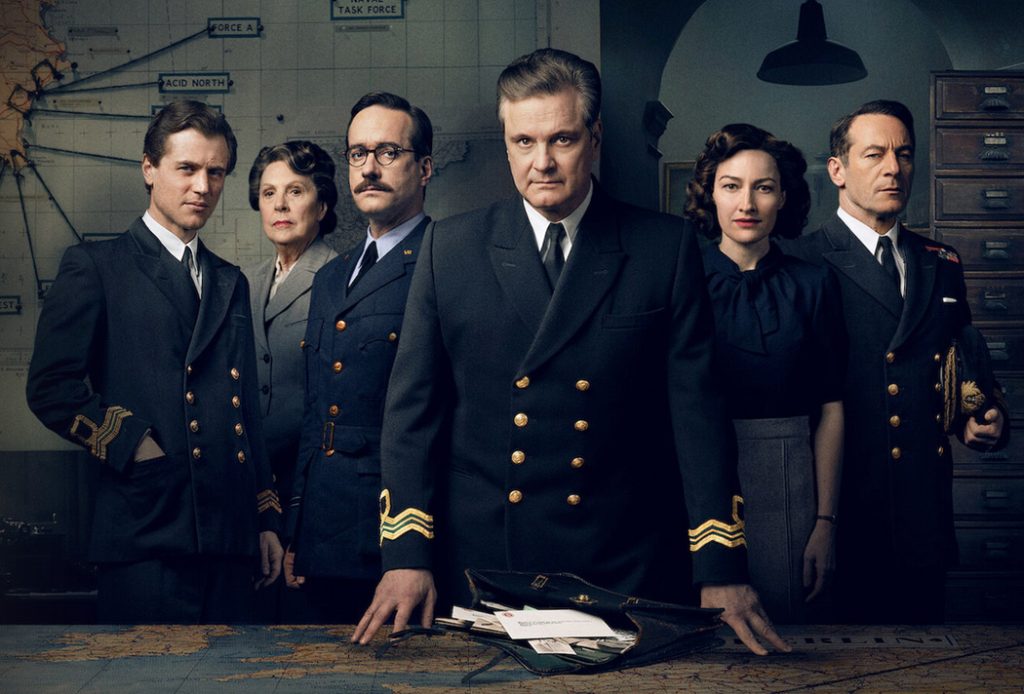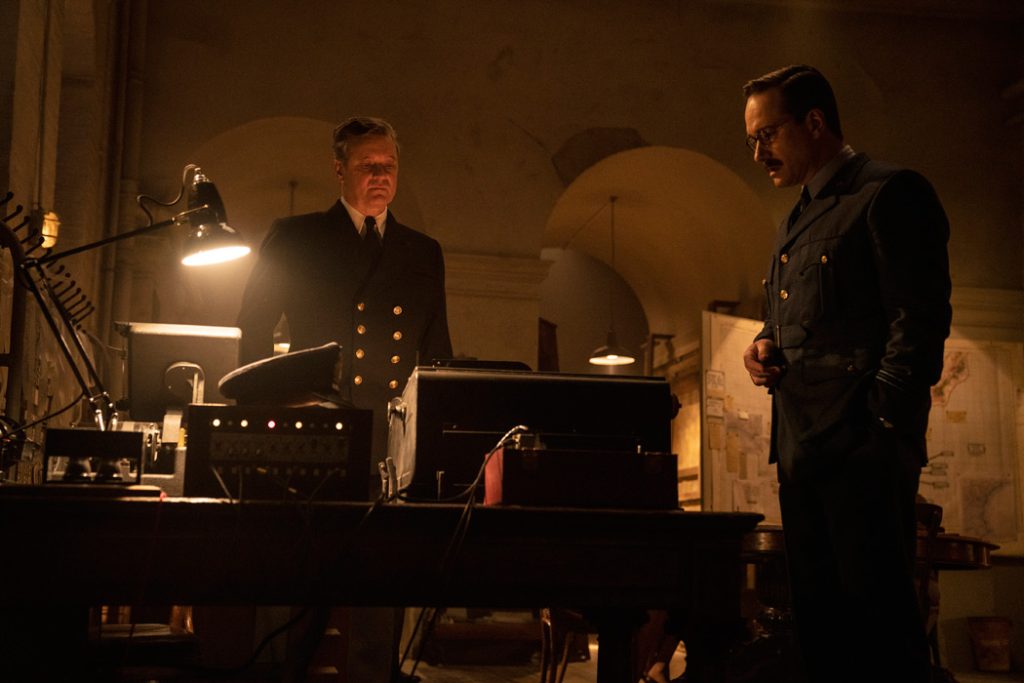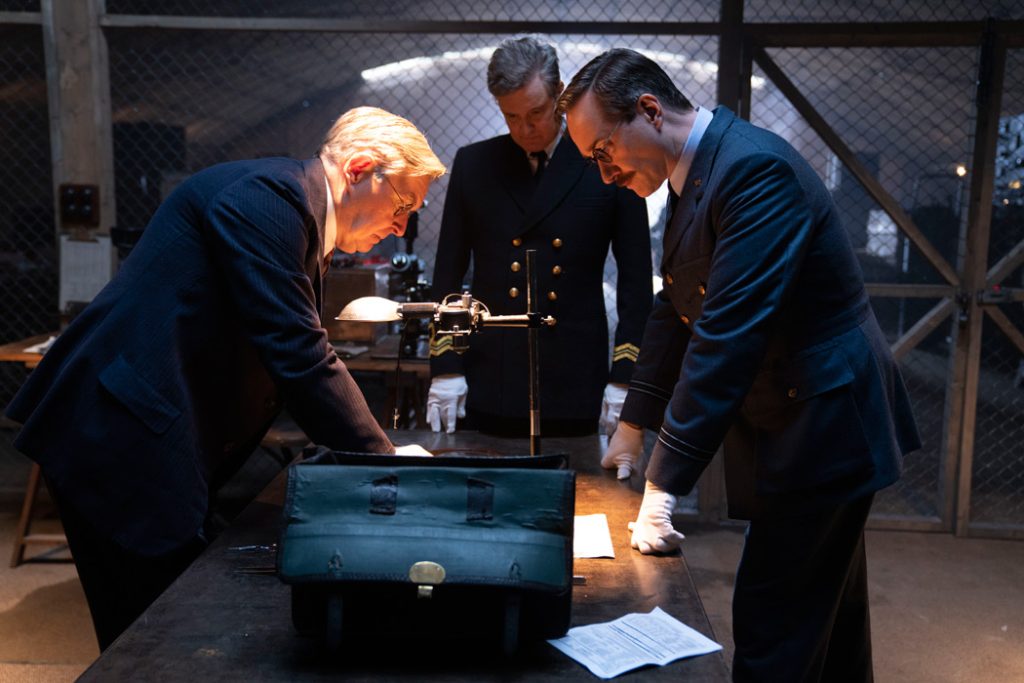
As the narrator (Johnny Flynn) suggests in the opening, Operation Mincemeat revisits a well-kept secret of WWII, the sleight of hand that fueled a critical Allied victory. He assures viewers that the “unseen” is as much a part of war as the noisy maneuvers we see and hear. Britain’s invisible strategy executed by Naval Intelligence is a historic feat that few of us are aware of. But the operation will be remembered as one of the Allies’ most successful deceptions, an idea that was born in fiction.
We interrupt this review with a friendly advisement to viewers who shy away from the war genre: you are safe here. This bloodless, battle-free movie keeps the war offstage where it won’t distract us. And as I recall, the rowdiest scene in the movie takes place in a bar. Operation Mincemeat is, sort of, a “think” genre, the cerebral task of British intelligence to invent the life and history of a man that never existed. But this wartime event also features intrigue, suspense, personal conflicts and flourishes, and even some comic relief, while the Allied military outcome hangs in the balance.

Available on Netflix, Mincemeat draws generously from the 2016 book by British historian Ben Macintyre, Operation Mincemeat: How a Dead Man and a Bizarre Plan Fooled the Nazis and Assured an Allied Victory. Leading the effort to create a flawless ruse is Ewen Montagu, played by the great Colin Firth. Montagu is a member of the Twenty Committee, Britain’s finest 20 experts in counterespionage, whose Roman numeral XX signified Double-Crossed. Montagu later channeled these historic days into a memoir, The Man Who Never Was, which was made into a 1956 movie.
Teaming with Montagu is former RAF Flight Lieutenant Charles Cholmondeley (Matthew Macfadyen), who had transferred to the upper ranks of British Intelligence. And while he and Montagu had some friction during those months of planning, they managed to turn an attempted misdirection into a stunning victory.
If the details of the deception seem cryptic, rest assured, the film will offer clarity, as will this review but in simpler detail. But first, how loyal did the film remain to the truth? The checklist is available through websites like Slate and History vs Hollywood, and NPR interview transcripts of Ben Macintyre. There’s also an interview on TheMarySue.com with screenwriter Michelle Ashford (Masters of Sex, The Pacific), who spent ten years studying Macintyre’s book and developing this screenplay. These assorted fact-checkers put many of our questions to rest, except one that we’ll get to. But Operation Mincemeat passes the truth test. The filmmakers embraced the premise on its own merit with a minimum of studio embellishment, and they set a wild tale free.

Back to the question, what exactly was the plan? And whose idea was this? We call your attention to a certain intelligence officer (played briefly by Johnny Flynn) who was the assistant to Britain’s Naval Intelligence Director, Rear-Admiral John Godfrey (played by Jason Isaacs). The name of this assistant was none other than Ian Fleming—before he was an author. Fleming was a fan of detective novels, and he apparently enjoyed brainstorming ideas on how to deceive an enemy. And here is where opinions vary on who did what.
Rear-Admiral Godfrey gave the intelligence officers the “Trout Memo,” a list of 54 ideas for enemy deception (and a metaphor for the patience required in trout fishing). Godfrey selected idea #28 for the officers to develop and execute, entitled, “A suggestion [not a very nice one].” To summarize, the ruse required: 1) false, misleading documents containing sensitive information, and 2) a corpse, with pockets (for stashing said documents). And 3) the dumping of the body where the enemy would find him. This was the chosen plan of deception, ready to be detailed into a workable scheme.

So … who was the author of the Trout Memo? The informed opinions do not yield a consensus. The author would have been either 1) Godfrey, 2) Fleming, or 3) Godfrey and Fleming. But Fleming claimed that idea #28 was his own contribution—it was something he read in a detective novel by Basil Thompson. Which would indicate that Fleming was at least one of the authors of the Trout Memo. And it suggests that the Allies might owe some gratitude to Basil Thompson, whose fictional corpse concept became the blueprint that spared the lives of thousands of Allied troops.
As the sun sets on Operation Mincemeat, we’re still processing a crazy idea that saved the free world. John Madden directs a finely tuned production with an -all-star cast, including Colin Firth, Matthew Macfadyen, Jason Isaacs, Kelly Macdonald, and Penelope Wilton. And rest assured, everyone delivers. Including the corpse.
